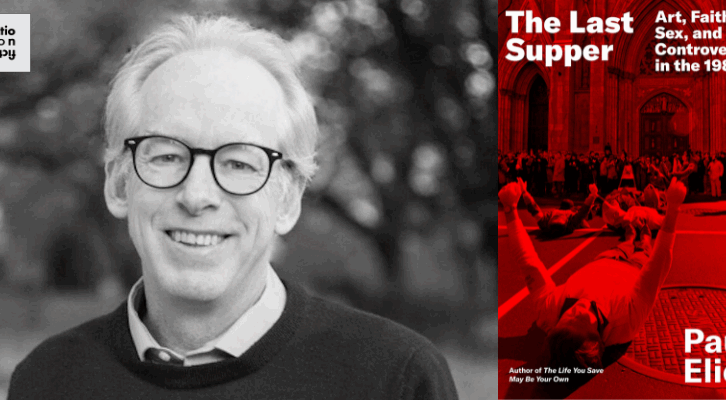Lee Child has sold millions of books worldwide, and his Jack Reacher character has virtually become a household name. This series follows the adventures of former American military policeman, Jack Reacher, a loner who wanders from place to place. (The latest in the series, The Midnight Line, is now out in paperback.) Lee’s first novel, Killing Floor, won both the Anthony Award, and the Barry Award for Best First Novel. After graduating from college, he worked in commercial television and was involved in producing shows like Brideshead Revisited and The Jewel in The Crown. But suddenly, at the age of 40, he was fired due to a corporate takeover and union-busting on the part of his employer.
That’s when Lee’s career as a novelist began. The rest is history.
Mark Rubinstein: Is it true that you created Jack Reacher from the smoldering embers of your own rage after you were let go by Granada Television?
Lee Child: It’s probably more accurate to say the type of adventures Reacher gets into is the product of that experience. I can’t say that Reacher, himself, was specifically related to that. I’d been in the entertainment business for a very long time by the point I left Granada Television. I learned very quickly that you cannot be successful by compiling a laundry list of virtues. You can’t say, ‘This is what the world is like; this is what I feel about it; therefore, I’ve got to have a protagonist with certain popular characteristics’. If you start with a shopping list of traits, you end up with a wooden character with very little spark and with barely an identity of his own.
Clearly, Reacher is an archetypal character. He’s a loner, a mysterious stranger with no history and no future, someone who just shows up on the day something has happened. He solves the problem and then rides off into the sunset. That archetype has been around forever: in American westerns, in the knightly sagas in Europe of the Middle Ages, in Scandinavian and Anglo-Saxon legends, even going back to religious myths. This kind of character was in the back of my mind, but I didn’t have a pre-formed design. I wanted Reacher to be authentic and organic.
One basic rule that applies is: it’s not the writer who decides whether a character is cool; the reader makes that decision. If a writer tries to force things—or lead the witness, as it were—the result is an embarrassing failure. So, really, I just metaphorically closed my eyes and wrote that first book, Killing Floor, and Jack Reacher emerged.
Mark Rubinstein: What has made you characterize the Jack Reacher books as ‘revenge novels’?
Lee Child: Revenge is basically the common theme for most of the books. It’s not necessarily Reacher taking revenge for himself. Often, it’s on behalf of someone else or on behalf of a situation in which an arrogant and contemptuous person prevails in an evil way. Fundamentally, he takes revenge for the perpetrator’s past felonies.
Mark Rubinstein: Do you personally share many of Reacher’s qualities of silent masculinity, brute force, and the wish for good to triumph over evil?
Lee Child: Well, I’m silent, certainly. I obviously wish for good to triumph over evil. Am I forceful and masculine? I’m an old guy now, but I do my best. [Laughter]
Mark Rubinstein: You’ve talked about Reacher being the embodiment of a masculine fantasy, and a feminine one, too. Tell us more.
Lee Child: When I wrote the first book, I felt it would appeal to men. I didn’t consciously plan it, but I’d created a situation of a man with no commitments, no responsibilities; and I felt that was a masculine fantasy. My thought was certainly borne-out since many men responded to that idea—no mortgage, no bills, no commitments. They could just walk away tomorrow. It appealed to a very powerful male fantasy.
But I also learned that some women were not only attracted to that sort of man, but they actually wanted to be that guy. It was also a woman’s fantasy—to be able to walk away and be somewhere else tomorrow. It’s a universal fantasy.
Mark Rubinstein: Reacher has an active sex life. Tell us about that and about writing erotic scenes.
Lee Child: Writing sex scenes is by far, the hardest and most ridiculous thing a writer can ever do. It’s virtually impossible to get it done with any plausibility. You know, Reacher loves women, like I do. One of the things I love about publishing is, generally speaking, almost everyone I deal with is a woman. I like them. Reacher likes them. And of course, something about Reacher makes women respond.
Writing sex scenes is by far, the hardest and most ridiculous thing a writer can ever do. It’s virtually impossible to get it done with any plausibility.I think part of Reacher’s appeal for women is he’s the ultimate safe affair. A woman can be guaranteed of a good time for twenty-four or forty-eight hours, and she can be guaranteed this guy will never call; he will never return. It’s safe. In real life, many affairs are not safe: you get found out; you get a divorce; you lose your house and half your money. It’s a nightmare.
In the fictional world, Reacher gets away with it. For everyone, for men and women, it’s appealing for someone to have a two or three-day fling, such as occurs in The Bridges of Madison County. I think many readers luxuriate in that same feeling. And Reacher, of course, will never get a woman in trouble by reappearing. It’s a no-consequences affair.
Mark Rubinstein: I suspect it’s no coincidence that Jack Reacher is exactly your height, six-feet, five inches? How much of Lee Child is in Jack Reacher?
Lee Child: Inevitably, we writers put a lot of ourselves in our protagonists. Anyone who writes will use a good deal of autobiography in a protagonist. It’s part of the writing process and it’s also fun to do. You can insert your own enthusiasm, jokes and opinions.
But, Reacher is not exactly my height. He’s one inch taller than I am. And that is very typical: most men writers will make a hero an inch taller and considerably more muscular than they are. [Laughter]. Women writers usually give their heroines better hair and thinner thighs. [More laughter]. They’re kind of idealized versions of ourselves. It gives us an alternative life where we can work things out a bit differently than they actually turned out.
Mark Rubinstein: I understand your knowledge of fighting isn’t just from research. You got into quite a few brawls as a youngster in Birmingham, UK. Tell us about that.
Lee Child: I always point out that my childhood was no different from anybody else’s. I wasn’t unique in having a bad situation as a kid; everybody’s situation is bad. I grew up in a gray, industrial landscape where there was economic austerity and very little for a kid to do. In that city, violence was a response to virtually everything. In my case, it was a bit more complicated because my parents were very aspirational for us to get an education and do well. That put a target on my back in a neighborhood like mine.
I grew up in a gray, industrial landscape where there was economic austerity and very little for a kid to do. In that city, violence was a response to virtually everything.If you’re viewed as being above your station, you become a target. I got a fellowship to a prestigious secondary school located on the better side of the city. So, from the age of eleven onward, I had to fight my way out of the neighborhood in the morning and back in during the afternoon. [More laughter]. I was very good at it. It was a part of my day I quite looked forward to. Reacher’s fighting ability really approximates mine at about age nine when I was bigger than everybody else.
Mark Rubinstein: While your books depict well-choreographed fight scenes, I’m more impressed by Reacher’s searing logic when thinking about criminals and their next moves. Will you talk about that?
Lee Child: I love that aspect, too. I think that’s a very strong strand in well-written crime or detective fiction: the sheer delight in watching a smart person figure something out. Of course, that dates back to Sherlock Holmes. The most compelling aspects of the books are the mental machinations of Holmes. That phenomenon has dominated the genre ever since because people love that. Reacher is very much in that tradition. He must think ahead and figure things out.
Mark Rubinstein: You were born Jim Grant but changed your name to Lee Child. Do you use your pen name in everyday life?
Lee Child: It’s now twenty-plus years of doing this as Lee Child, so almost everybody I’m in contact with apart from a very small handful of people, knows me as Lee Child. So, I just go with the flow. I think names are a weird thing anyway.
Mark Rubinstein: How so?
Lee Child: The people who gave me my allegedly real name were people I didn’t know at the time I was born. [Laughter]. And, I didn’t particularly like them later when I got to know them. [More laughter]. So, why would I feel obliged to keep that name? I think when we turn eighteen, we should all rename ourselves.
Mark Rubinstein: With your success, it’s clearly no longer about the money. What keeps you writing the Jack Reacher books?
it’s become an emotional contract. I used to be scared of going bankrupt. Now, I’m scared of letting people down.Lee Child: It used to be a financial need. I had a financial contract. Now, it’s an emotional contract. It’s a contract with the reader. It’s such a special relationship with the reader. The reader pays you the most important compliment—it’s not the money spent for the book; it’s the time the reader devotes to the book. If a reader doesn’t like the book, it’s not the wasted money I care about, it’s the time the reader has wasted. These people have given me a day of their lives, or two or three days, and I’ve got to respect that. I feel I’ve got to give them the very best product I can. Right now, millions of people are looking forward to a new Reacher book, and not to provide it would be insane. I think entertainment is fundamentally a two-way street. It’s a transaction. The audience wants something, and the author supplies it. That’s how it works. So yes, it’s become an emotional contract. I used to be scared of going bankrupt. Now, I’m scared of letting people down.
Mark Rubinstein: Other than the obvious, how has Jack Reacher changed your life?
Lee Child: He really hasn’t changed my life. Some writers get too close to their heroes, or even fall in love with them. When that happens, the hero’s appeal just falls off a cliff because the author is protective of him.
To avoid that, I aim to keep myself from liking Reacher a little bit less than the reader will like him. That keeps him honest. And, I refuse to think about him when I’m not writing. He’s not a feature of my everyday life. It’s necessary for me to maintain some distance from him so I can get on with what I need to do on a daily basis.
Mark Rubinstein: Do you ever wonder to yourself in certain situation, ‘What would Reacher do?’
Lee Child: [Laughter] I don’t need to wonder. I know exactly how he would react in any situation, since I’m the one who will make him respond. Occasionally, my wife and I will encounter some aggravating real-world situation and we’ll look at each other and think, ‘What would Reacher do?’ [More laughter].
Mark Rubinstein: You’re invited to a dinner party and you can invite any five people, dead or alive, from any walk of life to join you. Who would they be?
Lee Child: The thing is when you achieve prominence as an author, you get invited to those dinners. I’ve met many famous people including Paul McCartney and Barack Obama. They’re very cautious in public. They can’t really say what they’re thinking. Honestly, if I were invited to such a dinner, I would politely decline and choose to stay home and watch television.



















